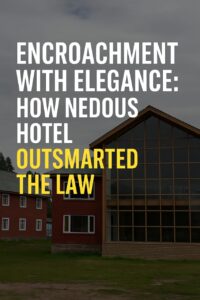Shielding Nedous: Administration Turns Watchdog into Lapdog
Gulmarg, July 22: In a glaring example of selective governance, the Nedous Hotel land encroachment case continues to expose the deep-rooted nexus between power and silence. Even after a week of renewed public outcry and continuous media coverage, the administration remains unmoved—despite clear and binding High Court orders issued in 2018.
Nedous Hotel, once a symbol of heritage, has become a case study in impunity. While the lease for the property expired in 1985 and its renewal was officially rejected in 2015, the hotel not only continued its operations illegally but also went on to construct a glass-framed luxury block in 2016. This construction, built over encroached government land, stands in direct violation of the High Court’s direction that all unauthorized occupants be evicted.
Local residents and activists have repeatedly questioned the delay and denial of action by the authorities. Despite the clear judicial mandate, the administration’s inaction has fueled serious concerns about bias and collusion.
Adding weight to these concerns, Zahoor Ahmad Dar, General Secretary of Rashtriya Kissan Mahasang (North), while speaking to Public TV, stated, “Nedous is always shielded by the administration. They are protecting the violator instead of upholding the law.”
While ponywalas, local shopkeepers, and tourist guides are frequently penalized for minor infractions, Nedous Hotel—occupying over 91 kanals of encroached land—continues to thrive without consequence. The double standard is not just evident, it is outrageous.
Sources reveal that rather than initiating recovery or enforcing eviction, certain sections of the administration may be playing an active role in delaying enforcement, keeping files buried, and providing tacit support to the illegal occupation.
The silence from officials is being viewed not as helplessness, but complicity. Court orders seem to have lost their weight, and justice appears reserved only for those without influence.
As locals grow increasingly frustrated, the larger question looms: How long will law take a backseat to legacy and luxury? And who in the administration will be held accountable for ignoring both the Constitution and the courts?


